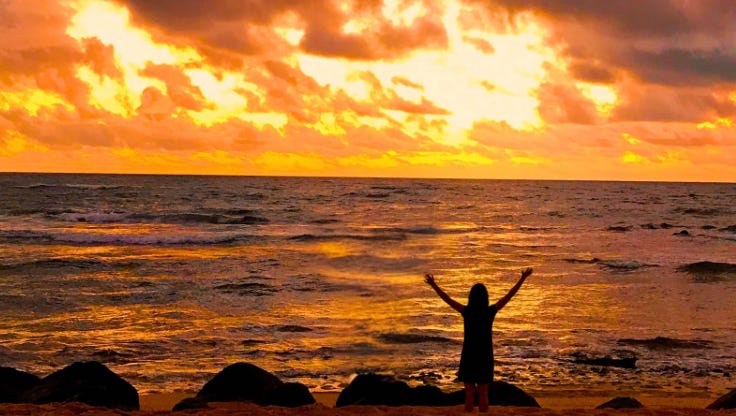Most of us don’t expect to outgrow our lives. We build careers, relationships, and routines that feel like home—until one day, they don’t.
Sometimes, change comes crashing in, unexpected and unwelcome. Other times, it arrives as a quiet knowing: this no longer fits. Either way, we’re left staring at the blank space ahead, wondering—are we losing something, or stepping into something new?
Why Change Feels Like an Ending
There’s a reason change can feel more like loss than opportunity. Our identities are often built on what we do and who we’ve been. A sudden shift—whether by choice or circumstance—can feel like an erasure of everything we’ve worked for.
I had lost myself when we moved to Hawaii full-time. I never expected this would happen to me. I’d always had my career path—albeit with a few pivots—but suddenly, I felt unmoored. My identity, the thing that had always grounded me, was slipping away. It took months of journaling and talking to trusted friends before I could begin to see a way forward.
We crave certainty, and change rarely gives us that. Instead, it asks us to move forward without guarantees, trusting that the next chapter will make sense only once we’ve started writing it. That uncertainty can be paralyzing—but it can also be where something new begins.
Turning the Page
The women in Women of the Canyon each face their own reckoning with change.
For Val, Riley, and Skylar, change felt like a hard stop—an ending. But what if it wasn’t?
Val left behind a career in nursing and the familiarity of her family’s farm, believing she was walking into the next phase of life. But once the dust settled, she felt unmoored—had she just erased the best parts of her story?
Riley had spent years building a name for herself in architecture, only to walk away and land in a place where none of that mattered. The excitement of a fresh start quickly faded into uncertainty. Who am I without the work that defined me?
Skylar, after decades of archaeological discoveries and publishing books, found herself staring at the unknown. Was she finished? Or was there still something left to uncover—about the world, about herself?
But Raven saw something they didn’t.
“You don’t start over,” she told Val. “You turn the page.”
And that’s what they did.
Val stopped searching for what she had lost and started listening for what felt like home. She didn’t need a hospital badge to care for people or acres of farmland to keep her hands in the soil.
Riley let go of the idea that success had to look the same as before. She wasn’t here to prove herself—she was here to build something that mattered to her.
Skylar realized she wasn’t done telling stories. Maybe the most important ones were the ones she had yet to write.
And me? I’ve rewritten my own story more times than I can count. Walking away from a business I built, moving across the ocean, shifting gears again at 72—it all felt like a risk. Like stepping into the unknown. But I’ve learned that change isn’t the end of the book.
It’s just the place where the next chapter begins.
A Life’s Threads Perspective
This theme of rewriting our stories—of seeing change as a beginning, not an end—is at the heart of Life’s Threads. My upcoming nonfiction mini-books explore these transitions, offering stories, lessons, and reflections on navigating the shifts that shape us.
If you’re standing at the edge of something new, wondering what comes next, remember:
The story isn’t over. You’re just turning the page.
I’d love to hear your stories. When have you had to turn the page on a new chapter in your life? Drop a comment or share your story with me.




I love this post, especially the descriptions of how each woman changed. Not to mention that stunning photo at the beginning! Subscribing…